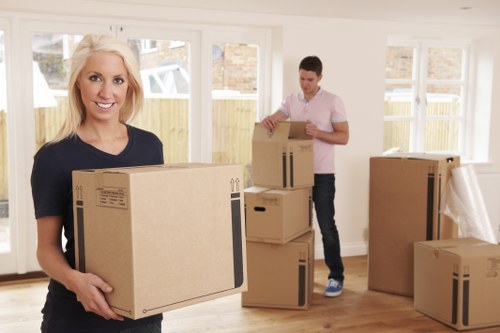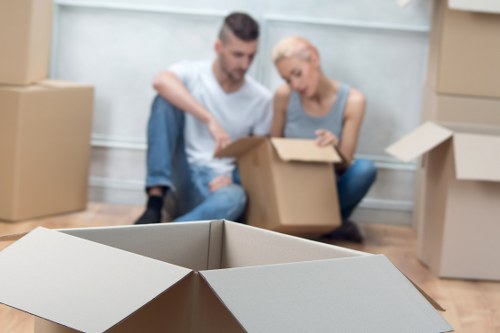Comprehensive Guide to Council Waste Collection in North London

Managing waste effectively is crucial for maintaining the cleanliness and health of any community. In North London, the council waste collection services play a vital role in ensuring that households and businesses dispose of their waste responsibly.
North London, known for its vibrant neighborhoods and diverse communities, relies heavily on efficient waste management systems. The council waste collection service is designed to cater to the unique needs of this bustling region.
Understanding how council waste collection works in North London can help residents better manage their waste and contribute to a cleaner environment.
Understanding Council Waste Collection

Council waste collection refers to the services provided by the local government to collect and manage household and commercial waste. In North London, this service is managed by the respective borough councils, each with its own set of guidelines and schedules.
The primary goal of council waste collection is to ensure that waste is collected regularly and disposed of in an environmentally friendly manner. This includes recycling, composting, and the proper disposal of hazardous materials.
Residents are typically provided with different types of bins for general waste, recycling, and sometimes food waste, depending on the borough.
Types of Waste Collected

Council waste collection in North London covers various types of waste to ensure comprehensive management. The main categories include:
- General Waste: Non-recyclable items that cannot be composted.
- Recycling: Materials like paper, glass, metal, and certain plastics that can be reprocessed.
- Food Waste: Organic waste that can be composted or processed in anaerobic digesters.
- Bulky Waste: Large items such as furniture and appliances that require special collection services.
- Hazardous Waste: Items like batteries, paints, and chemicals that need safe disposal methods.
Proper segregation of waste by residents ensures that each type is handled appropriately, reducing the environmental impact and promoting recycling efforts.
Collection Schedules and Procedures

Each borough in North London has its own waste collection schedule. Residents receive a calendar indicating the days for general waste, recycling, and food waste collection.
It's important to adhere to these schedules to prevent missed collections and ensure the smooth operation of waste management services. Typically, waste is collected weekly or bi-weekly, depending on the type and the borough's policies.
Residents should place their bins at the designated collection point on the specified day and remove them after collection to keep the streets tidy.
Recycling Initiatives and Programs

Recycling is a key component of council waste collection in North London. Borough councils have implemented various initiatives to encourage residents to recycle more effectively.
These programs include providing clear guidelines on what can be recycled, setting up recycling centers, and organizing community events to raise awareness about the importance of recycling.
Additionally, some councils offer incentives for households that consistently adhere to recycling guidelines, further promoting sustainable waste management practices.
Bulky and Hazardous Waste Collection
Bulky Waste
Dealing with bulky waste requires special attention. North London councils offer dedicated collection services for large items that cannot fit into standard bins.
Residents can book a collection date online or contact their local council for assistance. It's essential to schedule these collections in advance to ensure timely removal of bulky items.
Hazardous Waste
Hazardous waste poses significant risks to health and the environment. North London councils provide safe disposal methods for items like batteries, paints, and chemicals.
Residents are encouraged to use designated drop-off points or participate in special collection events to ensure hazardous materials are handled safely.
Special Collection Services
Electric Appliance Recycling
Electronic waste, such as old appliances, requires proper recycling to prevent environmental contamination. North London councils often partner with recycling firms to provide collection services for electronic items.
These services may be available at specific times of the year or upon request, ensuring that electronic waste is disposed of responsibly.
Garden Waste Collection
Garden waste, including leaves, branches, and grass clippings, can be composted or processed into mulch. North London councils offer garden waste collection services to help maintain green spaces and promote recycling of organic materials.
Residents can usually organize these collections through their local council's website or customer service centers.
Reducing Waste: Tips for North London Residents
Reducing waste at the source is essential for effective waste management. Here are some tips for North London residents:
- Practice Recycling: Always separate recyclable materials from general waste.
- Compost Organic Waste: Use compost bins for food scraps and garden waste.
- Minimize Single-Use Items: Opt for reusable bags, bottles, and containers.
- Repair Instead of Replace: Fix items when possible to extend their lifespan.
- Donate or Sell Unwanted Items: Give away items you no longer need instead of throwing them away.
Local Recycling Centers and Facilities

North London hosts several recycling centers where residents can drop off various types of waste. These facilities are equipped to handle different materials, ensuring they are processed correctly.
Knowing the locations and operating hours of these centers can make waste disposal more convenient and efficient for everyone.
Residents should check with their local council for the nearest recycling center and any specific guidelines they need to follow.
Technology and Innovations in Waste Collection
Advancements in technology have significantly improved waste collection services in North London. Smart bins equipped with sensors can notify councils when they are full, optimizing collection routes and reducing unnecessary trips.
Moreover, data analytics help councils understand waste patterns, enabling them to implement more effective waste management strategies.
Innovations like electric collection vehicles also contribute to reducing the carbon footprint of waste collection services.
Challenges Facing Council Waste Collection
Despite advancements, council waste collection in North London faces several challenges:
- Increasing Waste Volumes: Growing populations lead to more waste production, straining existing services.
- Recycling Contamination: Improper sorting of recyclables can contaminate entire batches, reducing recycling efficiency.
- Resource Limitations: Budget constraints can limit the ability to expand or improve waste collection services.
- Public Awareness: Educating residents about proper waste disposal is an ongoing challenge.
Future of Waste Management in North London

Looking ahead, North London councils are exploring sustainable waste management solutions. Plans include expanding recycling programs, investing in waste-to-energy technologies, and promoting a circular economy where materials are reused and recycled continuously.
Community engagement and collaboration with businesses and residents will be crucial in achieving these goals.
By focusing on sustainability, North London aims to create a cleaner, healthier environment for future generations.
Service Reliability and Customer Support
Reliable waste collection services are essential for maintaining public trust and community hygiene. North London councils prioritize punctuality and consistency in their collection schedules to meet residents' needs.
Additionally, customer support services are available to address any concerns, schedule special collections, or resolve issues related to waste management.
Feedback from residents helps councils improve their services and adapt to changing needs effectively.
Local Regulations and Compliance
Compliance with local regulations ensures that waste collection and disposal meet environmental standards. North London councils enforce rules regarding waste segregation, prohibited items, and penalties for non-compliance.
Residents must familiarize themselves with these regulations to avoid fines and contribute to effective waste management.
Educational programs and resources are often provided to help residents understand and adhere to these guidelines.
Community Involvement and Initiatives
Community involvement is key to successful waste management. North London councils collaborate with local organizations, schools, and businesses to promote waste reduction and recycling initiatives.
Events like neighborhood clean-ups, recycling drives, and educational workshops foster a sense of responsibility and collective effort towards a cleaner environment.
Engaging the community helps create lasting positive changes in waste management practices.
Benefits of Effective Waste Collection
Efficient waste collection services offer numerous benefits, including:
- Environmental Protection: Proper waste management reduces pollution and conserves natural resources.
- Public Health: Clean streets and proper waste disposal prevent the spread of diseases.
- Aesthetic Appeal: Regular waste collection keeps neighborhoods clean and attractive.
- Economic Savings: Recycling and waste reduction can lower disposal costs and generate revenue through material recovery.
- Community Well-being: A clean environment enhances the quality of life for all residents.
How to Get Involved

Residents can get involved in waste management efforts by:
- Participating in recycling programs and sorting waste correctly.
- Joining local clean-up events and community initiatives.
- Providing feedback to the council to help improve services.
- Educating others about the importance of waste reduction and recycling.
- Supporting policies and projects aimed at sustainable waste management.
Active participation from the community is essential for the success of waste management programs.
Tips for Efficient Waste Disposal
To ensure your waste is collected efficiently in North London, consider the following tips:
- Sort Your Waste: Separate recyclables, compostables, and general waste according to council guidelines.
- Use Appropriate Bins: Ensure you use the correct bins provided by your council for each type of waste.
- Follow Collection Schedules: Adhere to the designated collection days to avoid missed pickups.
- Prepare Your Bins: Place your bins at the collection point on time and remove them promptly after collection.
- Avoid Overloading: Do not overload bins to prevent collection vehicles from skipping pickups.
Environmental Impact of Waste Collection
Effective waste collection significantly impacts the environment. Proper disposal and recycling reduce the amount of waste that ends up in landfills, lowering greenhouse gas emissions and conserving valuable resources.
Moreover, recycling materials like paper, glass, and metals decreases the need for raw materials, supporting sustainable production practices and reducing environmental degradation.
By participating in council waste collection services, residents contribute to broader environmental conservation efforts.
Conclusion
Council waste collection in North London is a vital service that ensures the community remains clean, healthy, and sustainable. By understanding how the system works, participating actively, and adhering to local guidelines, residents can significantly impact their environment positively.
As North London continues to grow, effective waste management will remain a cornerstone of its urban planning, emphasizing the importance of community involvement and innovative solutions.
Frequently Asked Questions (FAQs)
1. How often is general waste collected in North London?
General waste is typically collected weekly in most North London boroughs, but it can vary depending on the specific council. It's best to check your local council's schedule for precise information.
2. Can I mix recyclables and general waste in the same bin?
No, it's important to separate recyclables from general waste to ensure proper recycling. Mixing them can contaminate the recyclables, making them unsuitable for processing.
3. How do I dispose of hazardous waste in North London?
Hazardous waste should not be disposed of in regular bins. North London councils provide special collection services or designated drop-off points for hazardous materials like batteries, paints, and chemicals.
4. What items are accepted in the recycling bin?
Recycling bins typically accept paper, cardboard, glass bottles and jars, metal cans, and certain plastics. It's important to check with your local council for a detailed list of accepted items.
5. How can I arrange a bulky waste collection?
To arrange a bulky waste collection, contact your local North London council either through their website or customer service center. Advance booking is usually required to schedule a collection date.